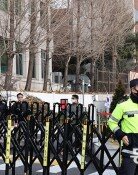Probing Yoon's insurrection charges
Probing Yoon's insurrection charges
Posted December. 30, 2024 08:05,
Updated December. 30, 2024 08:05
As the investigation into South Korean President Yoon Suk Yeol’s declaration of martial law deepens, new testimonies have emerged, alleging that Yoon had been discussing “emergency measures” for over a year to curb opposition legislative dominance and address alleged election fraud. While one of these measures catapulted him to the nation’s highest office, the other failed amid constitutional and legal challenges and lack of public support, leaving President Yoon facing impeachment proceedings and allegations of leading an insurrection.
Citizens are enduring the pain of witnessing a president, who once thrived on emergency measures, now faltering under them, as constitutional order remains unrestored for nearly a month. It is hard to see a former prosecutor general and sitting president resort to tactics such as "refusing to receive legal notices." The public is observing the stark contrast between his past actions—swiftly arresting National Intelligence Service (NIS) personnel without reporting to superiors—and his current refusal to comply with summonses from the prosecution and the Corruption Investigation Office for High-ranking Officials (CIO).
On Sunday, President Yoon once again refused the CIO's third summons. It now appears unlikely that he will voluntarily appear. Just as he once urgently investigated the NIS as a prosecutor, an emergency response to President Yoon is now imperative. The CIO must fully mobilize measures such as applying for an arrest warrant to promptly prevent evidence destruction. Furthermore, the Presidential Security Service must refrain from committing the grave mistake of obstructing the CIO's emergency measures. The public is calling for urgent action to restore constitutional order, and the Presidential Security Service’s loyalty should lie not with the president but with the people.







